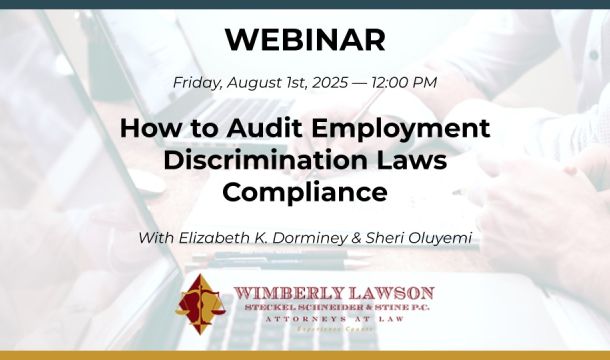FTC Proposes Rulemaking to Ban Non-compete Agreements
Non-compete agreements – provisions in employment contracts whereby an employee agrees not to accept future employment with a competitor, disclose trade secrets, or poach customers – have been widely used for decades. But on January 5, 2023, the Federal Trade Commission (FTC) issued a notice of proposed rulemaking (NPRM) that could not just limit, but ban their use. Here’s the link to the Federal Register notice.
The FTC argues that because such clauses prevent workers from leaving existing employers to start new jobs or businesses they hamper competition and discourage innovation. The proposed rule would not only ban the use of non-compete agreements in future employment contracts but also require employers to rescind existing non-compete agreements. The ban would include nondisclosure agreements that prevent employees from sharing knowledge they acquire in one job with a subsequent employer in the same field, and requirements that employees pay for specialized training if they abandon employment within a specified time period. The proposal would bar employers from entering into or enforcing such clauses with employees or independent contractors and require companies to nullify any existing ones within six months. There would be some exceptions for companies that want to require an owner or partner selling a business from immediately re-entering the field.
There is considerable disagreement on this issue. Many question the application of antitrust principles to regulate labor markets in the name of rectifying “economic inequality.” Some labor economists doubt whether banning non-compete agreements would have any meaningful impact in today’s tight labor market. Others point out that non-compete agreements encourage employers to invest in their workforce and protect valuable intellectual property and customer relationships.
The proposed rule would supersede inconsistent state rules. For example, Georgia imposes geographic and time limits on noncompete agreements which are more stringent than those tolerated in other states, but even these restrictions would be invalidated under the FTC’s rule.
Comments from the public are solicited for the next 60 days and may be submitted through the Federal Register’s portal at https://www.regulations.gov. Write “Non-Compete clause rulemaking: Matter No. P201200” on your comment and follow the instructions on the form.
In a related development, FTC has required Prudential Security, O-I Glass, Inc., and Ardagh Group SA to strike allegedly illegal non-compete agreements. This was the first time the had FTC ordered companies to take such action. In a published statement the FTC stated: “The Commission finds that the use of non-competes by these firms constituted an unfair method of competition and violated Section 5 of the FTC Act.”
The FTC orders required Prudential Security and its affiliate and the company’s owners to terminate the agreements with their security guards, in which the workers consented to not working for competitors within a 100-mile radius of the job site for two years after leaving Prudential. Similarly, glass container manufacturers O-I Glass and Ardagh are prohibited from imposing or enforcing non-compete agreements on workers, according to the FTC statement. The FTC is taking the position that competition in the industry has been hampered by the degree of concentration and exacerbated by non-compete agreements, which makes finding skilled workers difficult for new market entrants.
The FTC says these developments are significant, and claims that about 20% of the American workforce are limited by a non-compete agreement. A Treasury Department report estimates that a lack of competition for labor in restrictive agreements like non-competes likely reduced wages by as much as 20%. Non-compete clauses are already banned in a few states, such as California.
The FTC’s opinions are not universally shared, and these proposed rules are almost certain to be challenged in court. Recent rulings from the U.S. Supreme Court strongly suggest that when Federal agencies issue regulations with sweeping economic and political consequences, they are presumptively invalid unless Congress has specifically authorized that action. The “major question” doctrine, applied by the Supreme Court to invalidate some of the COVID-19 vaccine mandates, holds that Congress, not the agencies, must take responsibility for big changes. Comments filed by companies which stand to be affected by this new rule will surely reveal diverse viewpoints.
Questions? Need more information? Call Betsy Dorminey at 404-365-0900.
Related Content
Get Email Updates
Recent Content

TPS Update (as of 2/6/2026)

Job Interviews Can Be a Good Selection Device

Suggestions on How to Diffuse a Tense Situation

Employers Blame Unions for Recent Shutdowns

$27 Million Verdict against Employer on Disability Discrimination over Refusal to Return Employee to Work



